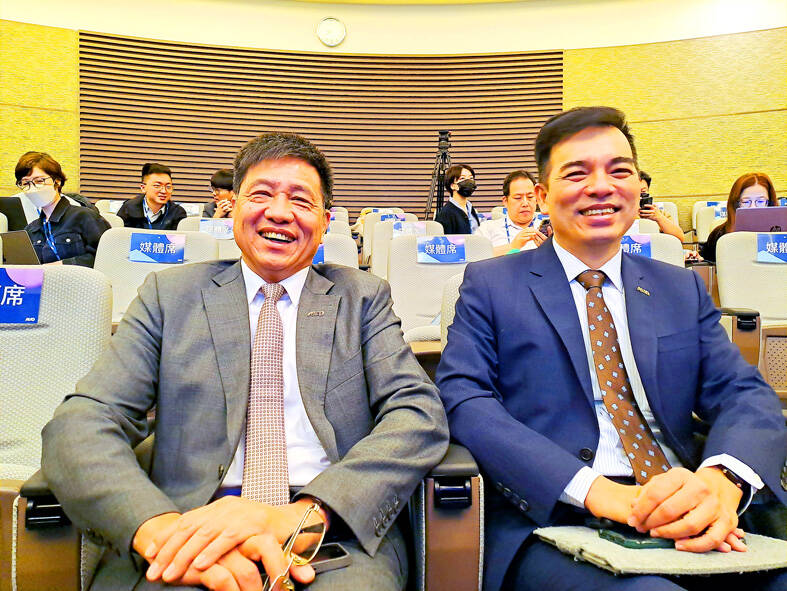Demand for PC flat panels has risen substantially in the past few months, indicating that the channel inventory correction cycle could bottom out next month after an 18-month digestion period, panelmaker AUO Corp (友達) said yesterday.
Industry analysts have been watching the PC panel sector in anticipation of a recovery, after the TV panel sector recovered last quarter. TV and PC panels are the two largest flat-panel sectors.
“We are seeing normal PC panel demand returning gradually, as opposed to rushed orders,” AUO chairman Paul Peng (彭双浪) told reporters on the sidelines of a green energy exhibition.

Photo: CNA
“PC panel inventory is glowing, returning to a healthy level,” he added.
Peng said he expects flat-panel demand to return to normal in the second half of this year.
Improvement can also be seen in panel prices, which are moving in a positive direction, he said.
Peng said he expects panel demand to better match supply in the next upcycle, given that no new capacity has been deployed by global panel manufacturers over the past two years.
AUO said it is expanding its businesses beyond flat panels, to cushion the firm from the shocks experienced during the flat panel industry’s boom-and-bust cycles.
The company aims to expand revenue contribution from its non-panel businesses to 20 percent in 2025, from 14 percent last year.
Among its non-panel businesses, AUO Envirotech Inc (友達宇沛) had the best growth momentum, with annual compound growth of 76 percent from 2020 through last year, the company said.
AUO Envirotech helps enterprises manage their consumption of water and electricity, it said.
AUO’s energy business helps customers assemble solar panels and operates solar farms. As of last year, the business unit has installed 500 megawatts of solar panels.
Shareholders have criticized AUO’s plan to distribute a cash dividend of NT$0.8. per share, as approved by its board of directors.
Peng said the company would usually not distribute a cash dividend when the company’s financial performance has drifted in the red.
This year is an exception, as AUO plans to allocate its capital surplus to fund the payment, the company said in a filing with the Taiwan Stock Exchange.
The cash dividend implies a yield of 4.44 percent compared with the stock’s closing price of NT$18 yesterday, Peng said.
Asked about progress in diversifying production sites, AUO said it is scouting sites for a production line in North America to assemble flat-panel modules for vehicles.
As vehicle displays become larger, customers are requesting panels locally to save on transportation fees, Peng said.
“As long as the China-US standoff persists, it is inevitable that companies will adopt the ‘China Plus One’ strategy to build manufacturing capacity outside of China,” Peng said.
The company has approved a NT$1 billion fund to build a new panel assembly line in Vietnam.Production is to begin in the first quarter next year.

SEMICONDUCTORS: The German laser and plasma generator company will expand its local services as its specialized offerings support Taiwan’s semiconductor industries Trumpf SE + Co KG, a global leader in supplying laser technology and plasma generators used in chip production, is expanding its investments in Taiwan in an effort to deeply integrate into the global semiconductor supply chain in the pursuit of growth. The company, headquartered in Ditzingen, Germany, has invested significantly in a newly inaugurated regional technical center for plasma generators in Taoyuan, its latest expansion in Taiwan after being engaged in various industries for more than 25 years. The center, the first of its kind Trumpf built outside Germany, aims to serve customers from Taiwan, Japan, Southeast Asia and South Korea,

Gasoline and diesel prices at domestic fuel stations are to fall NT$0.2 per liter this week, down for a second consecutive week, CPC Corp, Taiwan (台灣中油) and Formosa Petrochemical Corp (台塑石化) announced yesterday. Effective today, gasoline prices at CPC and Formosa stations are to drop to NT$26.4, NT$27.9 and NT$29.9 per liter for 92, 95 and 98-octane unleaded gasoline respectively, the companies said in separate statements. The price of premium diesel is to fall to NT$24.8 per liter at CPC stations and NT$24.6 at Formosa pumps, they said. The price adjustments came even as international crude oil prices rose last week, as traders

Taiwan Semiconductor Manufacturing Co (TSMC, 台積電), which supplies advanced chips to Nvidia Corp and Apple Inc, yesterday reported NT$1.046 trillion (US$33.1 billion) in revenue for last quarter, driven by constantly strong demand for artificial intelligence (AI) chips, falling in the upper end of its forecast. Based on TSMC’s financial guidance, revenue would expand about 22 percent sequentially to the range from US$32.2 billion to US$33.4 billion during the final quarter of 2024, it told investors in October last year. Last year in total, revenue jumped 31.61 percent to NT$3.81 trillion, compared with NT$2.89 trillion generated in the year before, according to

SIZE MATTERS: TSMC started phasing out 8-inch wafer production last year, while Samsung is more aggressively retiring 8-inch capacity, TrendForce said Chipmakers are expected to raise prices of 8-inch wafers by up to 20 percent this year on concern over supply constraints as major contract chipmakers Taiwan Semiconductor Manufacturing Co (TSMC, 台積電) and Samsung Electronics Co gradually retire less advanced wafer capacity, TrendForce Corp (集邦科技) said yesterday. It is the first significant across-the-board price hike since a global semiconductor correction in 2023, the Taipei-based market researcher said in a report. Global 8-inch wafer capacity slid 0.3 percent year-on-year last year, although 8-inch wafer prices still hovered at relatively stable levels throughout the year, TrendForce said. The downward trend is expected to continue this year,